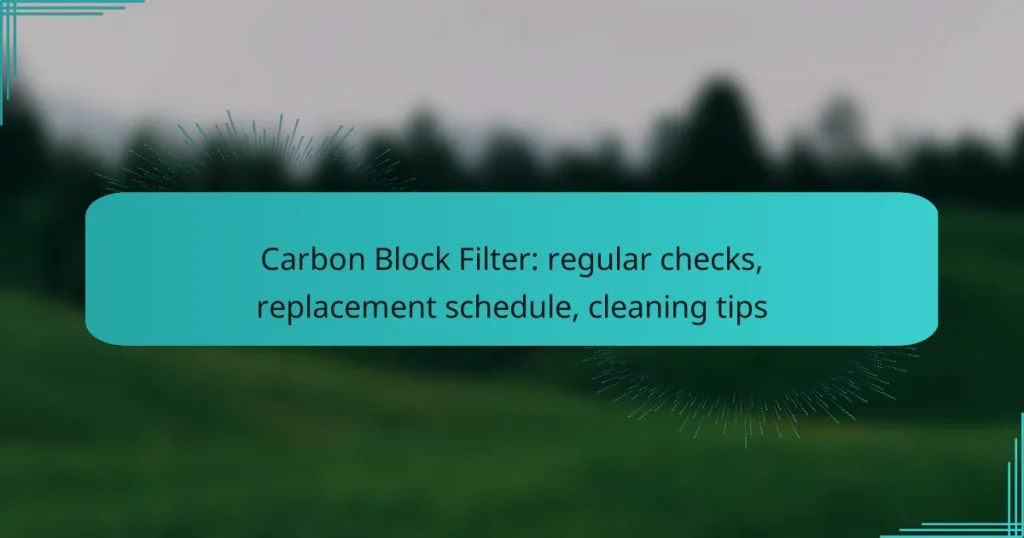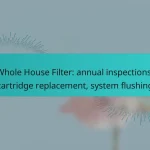Maintaining your carbon block filter is crucial for ensuring optimal performance and safe drinking water. Regular checks, including monthly inspections and quarterly performance tests, are recommended, along with a replacement schedule of every 6 to 12 months based on usage and water quality. Additionally, proper cleaning techniques can extend the filter’s lifespan and enhance water quality.
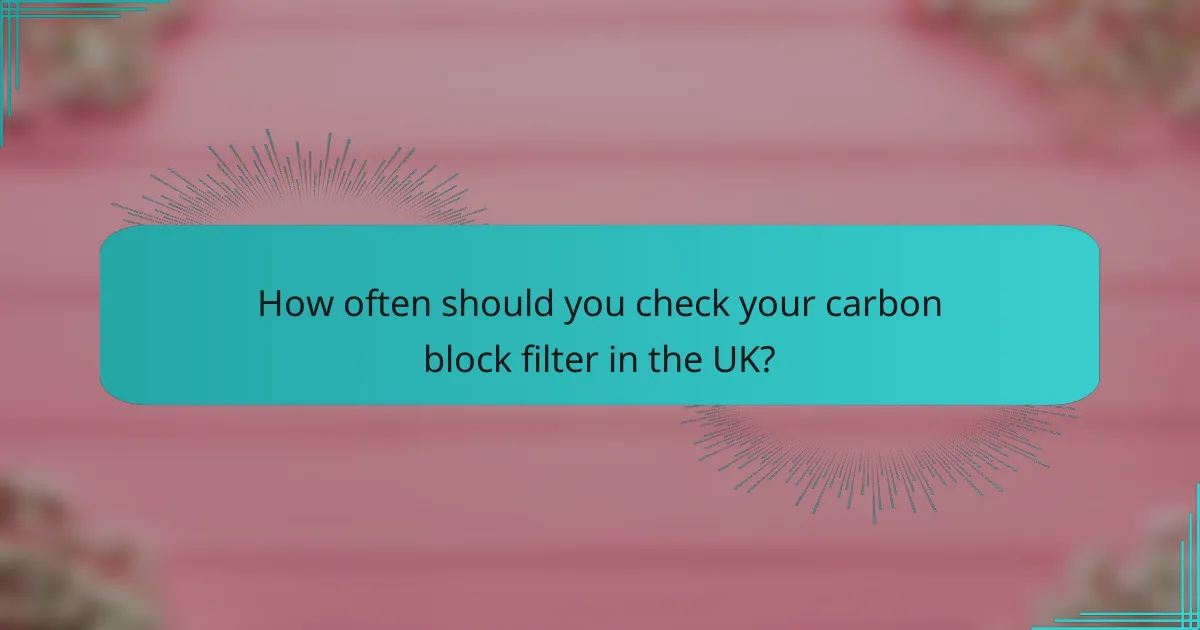
How often should you check your carbon block filter in the UK?
You should check your carbon block filter regularly to ensure optimal performance and water quality. A typical schedule includes monthly visual inspections, quarterly performance tests, and annual professional assessments.
Monthly visual inspections
Conducting monthly visual inspections of your carbon block filter is essential for early detection of issues. Look for signs of discoloration, cracks, or any unusual buildup on the filter surface. If you notice any significant changes, consider replacing the filter sooner than planned.
During these inspections, ensure that the filter is securely installed and that there are no leaks in the housing. Keeping a log of your findings can help track any recurring problems.
Quarterly performance tests
Every three months, perform a performance test to assess the effectiveness of your carbon block filter. This can involve checking the water flow rate and testing for contaminants to ensure the filter is functioning properly. If you notice a drop in performance, it may indicate that the filter needs replacement.
Consider using a water testing kit that measures common contaminants like chlorine or sediment. This will give you a clearer picture of the filter’s effectiveness and help you decide if it needs to be changed.
Annual professional assessments
Once a year, schedule a professional assessment of your carbon block filter. A qualified technician can conduct a thorough evaluation, ensuring that the filter meets safety and performance standards. They can also identify any potential issues that might not be evident during your regular checks.
During this assessment, the technician may recommend replacing the filter based on its condition and your water quality needs. This proactive approach can help maintain optimal water quality and extend the lifespan of your filtration system.
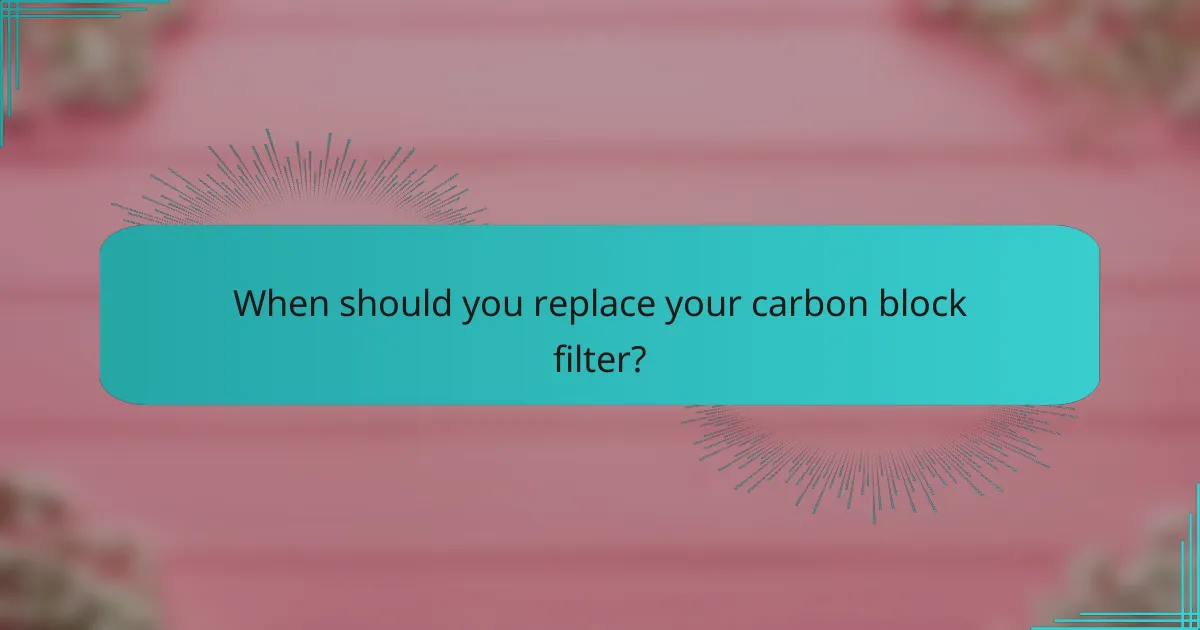
When should you replace your carbon block filter?
You should replace your carbon block filter every 6 to 12 months, depending on usage and water quality. Regular checks will help ensure optimal performance and safe drinking water.
Every 6 to 12 months
A general guideline is to replace your carbon block filter every 6 to 12 months. If your water usage is high or if you live in an area with poor water quality, consider replacing it closer to the 6-month mark. Keeping a calendar reminder can help you stay on schedule.
Check the manufacturer’s recommendations, as some filters may have specific replacement intervals based on their design and capacity. Regular replacement is crucial for maintaining effective filtration.
Signs of reduced water flow
If you notice a significant decrease in water flow from your faucet, it may indicate that your carbon block filter is clogged and needs replacement. A slow drip instead of a steady stream can be a clear sign of reduced performance.
To assess water flow, compare it with the flow rate when the filter was new. If the difference is noticeable, it’s time to change the filter to ensure efficient water delivery.
Unpleasant taste or odor
Unpleasant tastes or odors in your drinking water can signal that your carbon block filter is no longer effective. Activated carbon is designed to remove contaminants that cause these issues, so any return of these characteristics suggests the filter is saturated.
Trust your senses; if the water tastes or smells off, replace the filter promptly. This will help maintain the quality of your drinking water and ensure it remains safe and pleasant to consume.
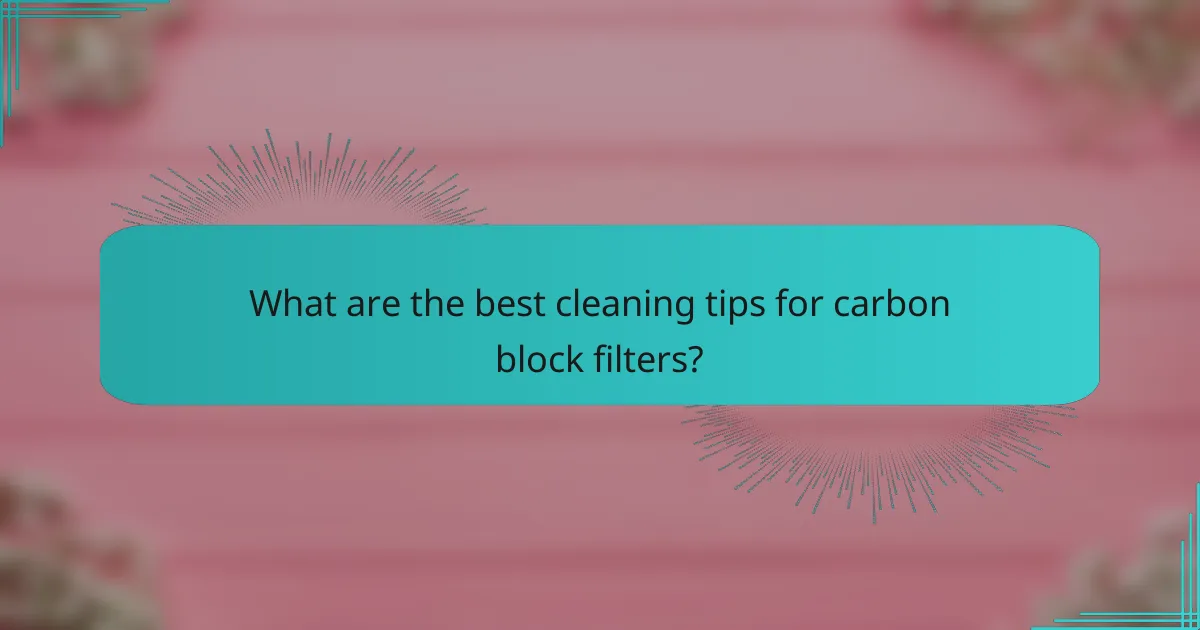
What are the best cleaning tips for carbon block filters?
To maintain the effectiveness of carbon block filters, regular cleaning is essential. Using the right cleaning methods can extend the life of the filter and ensure optimal water quality.
Use mild soap and water
When cleaning carbon block filters, opt for mild soap and warm water. This combination effectively removes dirt and contaminants without damaging the filter material.
Soak the filter in the soapy water for a few minutes, then gently scrub it with a soft cloth or sponge. Avoid using harsh chemicals that could degrade the filter’s performance.
Avoid abrasive materials
Using abrasive materials, such as steel wool or rough sponges, can scratch and damage the surface of carbon block filters. This damage can lead to reduced filtration efficiency and shorter filter lifespan.
Stick to soft cloths or non-abrasive sponges to ensure the integrity of the filter remains intact during cleaning. This simple precaution helps maintain the filter’s effectiveness over time.
Rinse thoroughly before reinstallation
After cleaning, it’s crucial to rinse the carbon block filter thoroughly with clean water. Residual soap can interfere with the filter’s ability to purify water, leading to undesirable tastes or odors.
Ensure all soap is washed away by running water through the filter for several minutes. This step guarantees that the filter is ready for effective use once reinstalled.
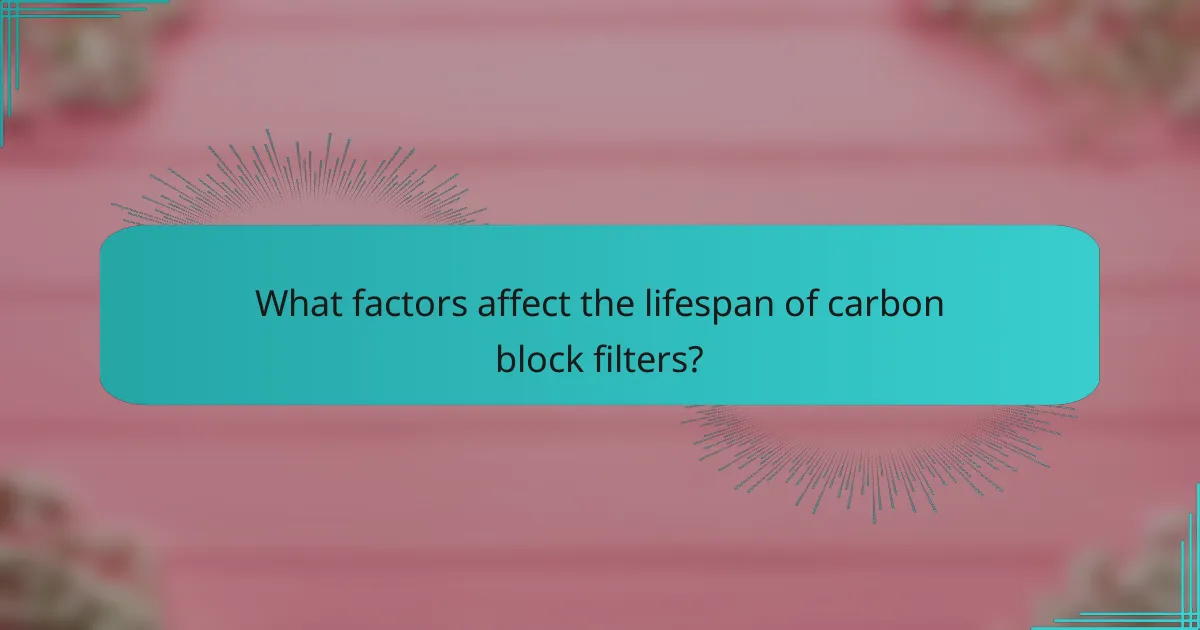
What factors affect the lifespan of carbon block filters?
The lifespan of carbon block filters is influenced by several key factors, including water quality, usage frequency, and the specific brand and specifications of the filter. Understanding these factors can help you maintain optimal performance and determine when to replace your filter.
Water quality and contaminants
The quality of water being filtered plays a significant role in the lifespan of carbon block filters. High levels of contaminants, such as chlorine, sediment, and heavy metals, can saturate the filter more quickly, reducing its effectiveness. Regular testing of your water can help you identify specific contaminants that may require more frequent filter replacements.
For example, if your water supply has elevated levels of chlorine, you might need to replace your filter every 2-3 months instead of the typical 6 months. Keeping track of the types and concentrations of contaminants can guide your maintenance schedule.
Usage frequency
The frequency of filter usage directly impacts its lifespan. Filters used in households with heavy water consumption, such as large families or frequent cooking, will deplete faster than those in less active settings. If you notice a decrease in water flow or taste, it may indicate that your filter is nearing the end of its life.
As a rule of thumb, if your household uses more than 100 gallons of water per week, consider checking and possibly replacing your filter every 4-6 months. This proactive approach can help ensure that you always have clean, safe drinking water.
Filter brand and specifications
The brand and specifications of carbon block filters can vary widely, affecting their lifespan and performance. Higher-quality filters often have better materials and construction, leading to longer-lasting effectiveness. Always choose filters that meet recognized standards, such as NSF/ANSI certifications, to ensure reliability.
When selecting a filter, check the manufacturer’s recommendations regarding replacement intervals. Some brands may suggest replacements every 6 months, while others may last up to a year under optimal conditions. Understanding these specifications can help you make informed decisions about your filter maintenance.

How do you choose the right carbon block filter for your needs?
Choosing the right carbon block filter involves understanding your specific water quality needs and system requirements. Key factors include flow rate, compatibility with existing systems, and filter certifications to ensure effective contaminant removal.
Consider flow rate requirements
Flow rate is crucial as it determines how quickly water can be filtered. Most household carbon block filters have flow rates ranging from 0.5 to 3 gallons per minute (GPM). Assess your daily water usage to select a filter that meets your needs without sacrificing pressure.
For example, if you have multiple faucets or appliances using water simultaneously, opt for a filter with a higher flow rate. Always check the manufacturer’s specifications to ensure the filter can handle your household’s demand.
Check compatibility with existing systems
Compatibility with your current plumbing system is essential when selecting a carbon block filter. Ensure that the filter fits your existing connections and can be integrated without requiring extensive modifications. Most filters come in standard sizes, but verifying compatibility can save time and costs.
Consider whether you need a point-of-use filter for a specific tap or a whole-house system. Each option has different installation requirements and may affect your choice of filter type.
Evaluate filter certifications
Filter certifications indicate the effectiveness and safety of the carbon block filter. Look for certifications from organizations such as NSF International or the Water Quality Association, which ensure the filter meets specific performance standards.
Common certifications include NSF/ANSI Standard 42 for aesthetic effects and Standard 53 for health effects. Filters with these certifications are more likely to effectively reduce contaminants like chlorine, lead, and other harmful substances.

What are the benefits of using carbon block filters?
Carbon block filters are effective at removing impurities and contaminants from water, improving taste and safety. They work by adsorbing chemicals, chlorine, and sediment, making them a popular choice for both residential and commercial water filtration systems.
Regular checks
Regular checks of carbon block filters are essential to ensure optimal performance. Inspect the filter every month for any signs of clogging or discoloration, which can indicate that it is time for a replacement. Keeping a maintenance schedule helps prevent water quality issues.
Replacement schedule
Typically, carbon block filters should be replaced every 6 to 12 months, depending on usage and water quality. For households with high water consumption or areas with poor water quality, more frequent replacements may be necessary. Always refer to the manufacturer’s guidelines for specific recommendations.
Cleaning tips
While carbon block filters cannot be cleaned like some other types, you can extend their life by flushing them with clean water regularly. Avoid using harsh chemicals or scrubbing the filter, as this can damage the carbon material. Instead, simply run water through the filter to remove any loose particles.
